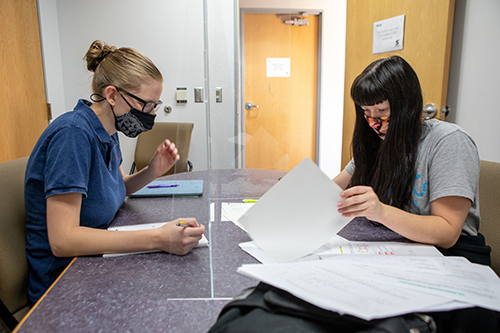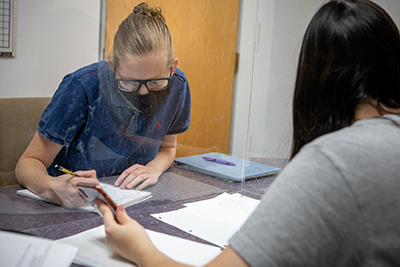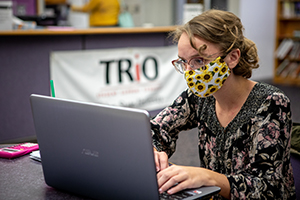Weber State Adds Fifth TRIO Program After Winning $1.3 Million in Competitive Federal Grant Competition
OGDEN, Utah – With the support of a highly selective federal grant, Weber State University will launch a new program this fall to support disadvantaged students as they pursue degrees in science, technology, engineering and math.
The program, called Student Support Services (SSS) – STEM, will be funded by a $1.3 million U.S. Department of Education grant awarded to the university in August. The grant, which will span five years and serve 120 students annually, is administered through the federal department’s TRIO Program in Student Support Services. The goal of TRIO SSS is to “increase the college retention and graduation rates of its participants,” who are all from disadvantaged backgrounds, according to the U.S. Department of Education. Weber State’s SSS STEM program will begin recruiting students this fall.
 The new STEM-focused program will join four other federally funded TRIO programs at Weber State: Student Support Services; Educational Talent Search; Upward Bound; and Veterans Upward Bound. Weber State hosts the highest number of TRIO programs at an institution of higher education in Utah.
The new STEM-focused program will join four other federally funded TRIO programs at Weber State: Student Support Services; Educational Talent Search; Upward Bound; and Veterans Upward Bound. Weber State hosts the highest number of TRIO programs at an institution of higher education in Utah.
It’s rare for a university to receive TRIO grant funding for a new program, said Eddie Hoyle, director of Student Support Services at Weber State — but that’s exactly what happened in August when Weber State was awarded the STEM-focused TRIO grant.
“We actually submitted two proposals, and both were funded,” Hoyle said. “It's more likely to get an existing program re-funded, but to get a brand new program funded is next to impossible, so we're very excited to get the new SSS STEM.”
Among Weber State’s existing TRIO programs is the Student Support Services Program, which serves 285 students annually with advising, tutoring, and sometimes direct financial support. In order to participate, students must have a low-income background, a disability or be among the first generation in their families to graduate with a bachelor’s degree. Unlike the new STEM program, participants in the existing program can major in any subject.
Weber State sought TRIO funding to support STEM students in particular because they identified a high number of students pursuing STEM degrees who were also eligible for TRIO programs, according to Hoyle.
“We like to consider ourselves a home away from home on campus,” Hoyle said, referring to the program’s suite of offices and study spaces at the Student Services Building.
 “Participants in the program often aren't comfortable in a higher ed environment when they get here,” Hoyle continued. “They maybe haven't had people in their family to tell them what college is like, they haven't experienced the campus, and so there's a lot of insecurity and intimidation. But if they can just come to our offices, we can make them feel very comfortable, answer all their questions and lead them in the right direction, wherever they need to go."
“Participants in the program often aren't comfortable in a higher ed environment when they get here,” Hoyle continued. “They maybe haven't had people in their family to tell them what college is like, they haven't experienced the campus, and so there's a lot of insecurity and intimidation. But if they can just come to our offices, we can make them feel very comfortable, answer all their questions and lead them in the right direction, wherever they need to go."
Isabel Hernandez Martinez, a sophomore studying mechanical engineering, started participating in the program at the beginning of her first year of college. She received direct financial support from the program that year, as well as a book loan for an expensive anatomy and physiology textbook. This significantly lessened her stress, she said.
“I definitely think the financial support helped me get more involved in school because I participate in a few clubs here on campus,” Martinez said. Without the extra support, she would have spent more time working, she said.
Martinez has also appreciated the workshops the program offers on subjects such as financial aid, study skills and time management, she said.
“They helped me become successful, and in return, once I get my career going, I hope to give back to the SSS center,” she said.
Candace Mascarenas, a junior majoring in psychology and criminal justice, just joined the program. As a non-traditional student and mother of five, she wants to take advantage of any support that’s offered — especially during the COVID-19 pandemic, which has created additional challenges for her and her family.
 “It’s really hard to go to school, especially now, when my kids have virtual school, and I have to try to help them while I’m also going to school. That’s why I chose to apply to see if I could get any additional help,” Mascarenas said. “It's been really amazing to feel like I'm getting support, and that I'm getting sent these emails from the program with scholarship opportunities that I can try for, rather than having to seek them out, because I just don't have enough time to do that and do my studies and do my family.”
“It’s really hard to go to school, especially now, when my kids have virtual school, and I have to try to help them while I’m also going to school. That’s why I chose to apply to see if I could get any additional help,” Mascarenas said. “It's been really amazing to feel like I'm getting support, and that I'm getting sent these emails from the program with scholarship opportunities that I can try for, rather than having to seek them out, because I just don't have enough time to do that and do my studies and do my family.”
This SSS Program has been on campus for decades, Hoyle said. Its history is almost as long as the life of the federal TRIO Programs, which were established in the 1960s through federal legislation as part President Lyndon B. Johnson’s War on Poverty.
“Even though TRIO programs are federally funded, they've been able to exist through every administration and Congress since they were created. There's a lot of bipartisan support,” Hoyle said. “The reason is that they are successful. We're given a set of objectives that we’re required to meet, and if we don't meet them, the programs aren't re-funded.”
Since the SSS Program was founded at Weber State, it has been continuously re-funded through TRIO SSS with each grant reapplication cycle, Hoyle said. This was true again in August, when the program was awarded $2.4 million over five years.
For more news about Weber State University, visit weber.edu/wsutoday.
For photos, click on this link.
Megan Olsen, Office of Marketing & Communications
801-626-7948 • meganolsen9@weber.edu- Contact:
Eddie Hoyle, Student Support Services director
801-626-7349 • ehoyle@weber.eduIsabel Hernandez, TRIO SSS Program participant
ihernandezmartinez@mail.weber.eduCandace Mascarenas, TRIO SSS Program participant
candacemascarenas@mail.weber.edu